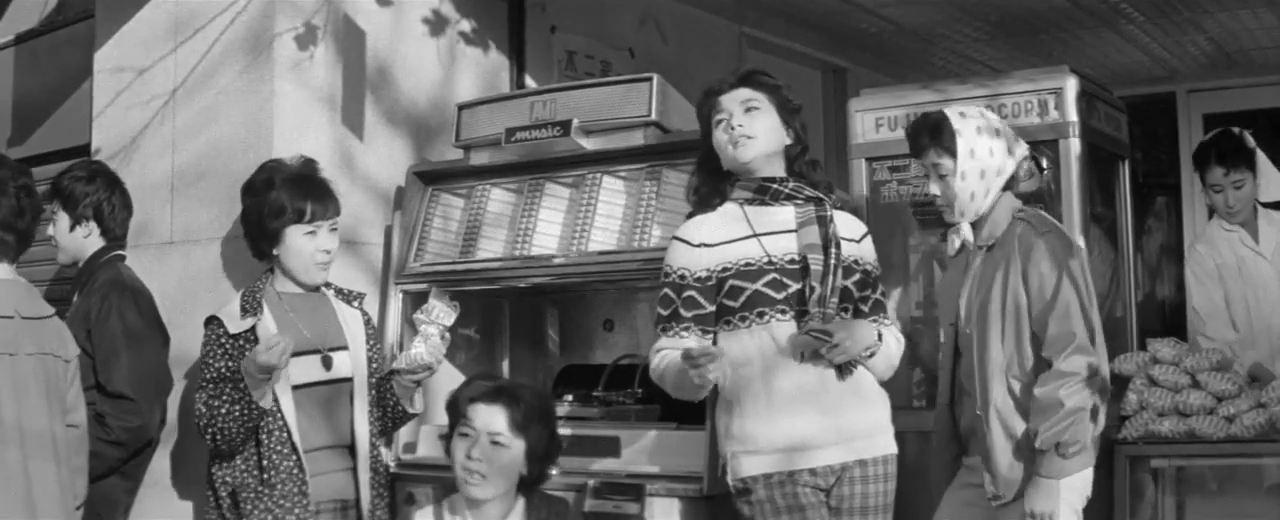Japan
狼やくざ 殺しは俺がやる [Ōkami yakuza: Koroshi wa ore ga yaru / Yakuza Wolf: I Perform Murder / The Lone Assassin] (Ryūichi Takamori, 1972)
Jul
13
lollipops

One of the gang members, immaculately dressed in all-black and small like a child, walks along a seedy street holding an oversized rainbow lollipop. DP: Yoshio Nakajima.
鴎よ、きらめく海を見たか めぐり逢い [Kamome-yo, kirameku umi o mitaka/meguri ai / Oh Seagull, Have You Seen the Sparkling Ocean? An Encounter] (Kenji Yoshida, 1975)
May
30
Pokkī

A young woman in a red-and-white striped sweater (Yōko Takahashi) leafs through fashion magazines strewn out before her on a grass-green carpeted floor while chewing a Pokkī. On a small stove close to her a fire truck red coffee pot. DP: Kōshirō Ōtsu.
少年 [Shōnen / Boy] (Nagisa Ōshima, 1969)
May
6
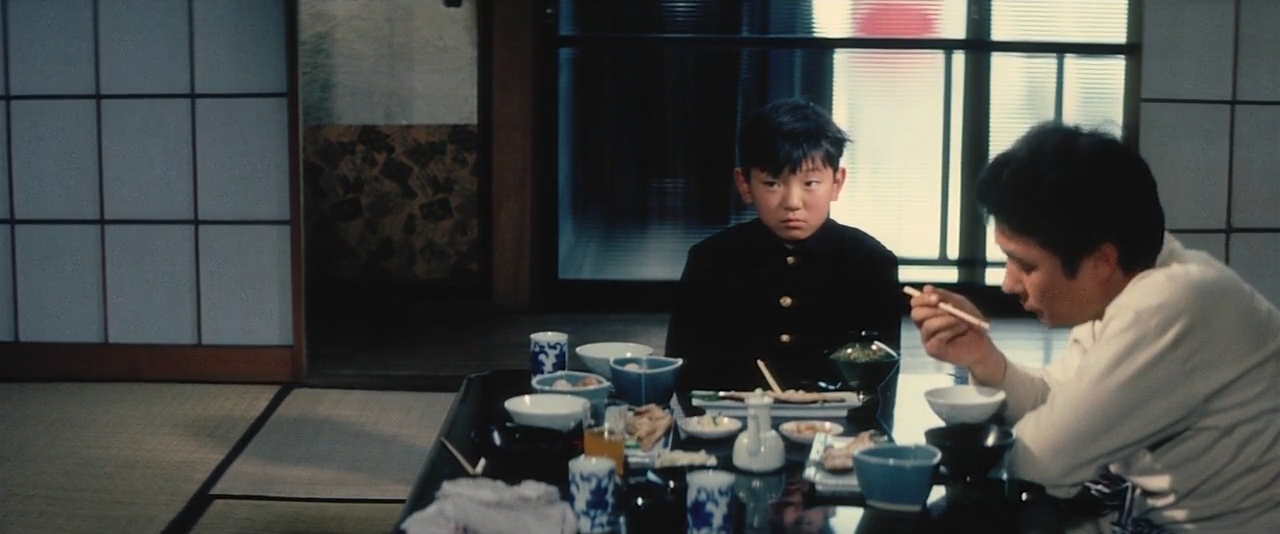
The boy in his school uniform (Bin Amatsu) at a table in a traditional Japanese room with his meal untouched. A man eats next to the kid who glances at someone or something offscreen. The table is set for three. DPs: Seizō Sengen & Yasuhiro Yoshioka.
“Empires, the past – they're beyond me! Will things change for the better? Will bums like these disappear? And the slums too? Come on. Tell us!”太陽の墓場 [Taiyō no hakaba / Grave of the Sun / The Sun's Burial] (Nagisa Ōshima, 1960)
Mar
31
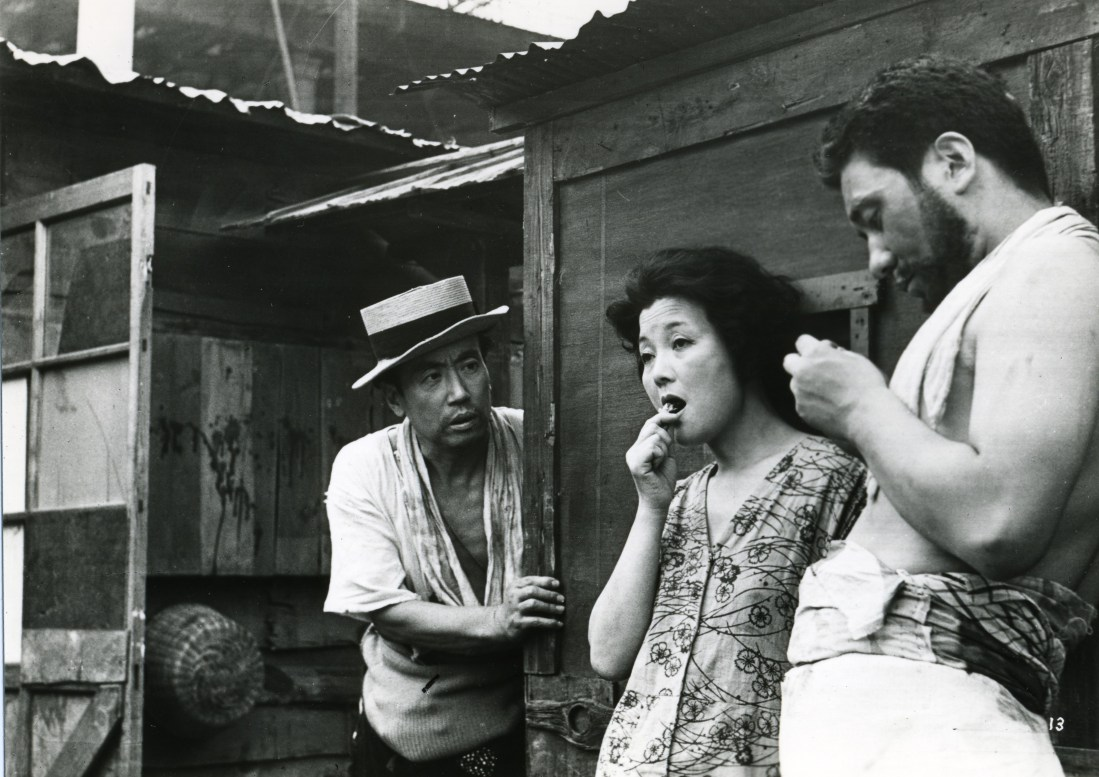
An empty-looking woman eats something while a scrawny man in a pork pie hat and dirty shirt eyes her. Next to the woman a bulking bearded guy, cleaning his nails. DP: Takashi Kawamata.
– Hanako
火まつり [Himatsuri / Fire Festival] (Mitsuo Yanagimachi, 1985)
Feb
16
water

A man drinks from a small stream like an animal. DP: Masaki Tamura.
– So what is your goal in life then? – Satisfaction of the present. The sword, and nothing else.剣 (小説) [Ken / The Sword] (Kenji Misumi, 1964)
Dec
29
Tick Tock Day
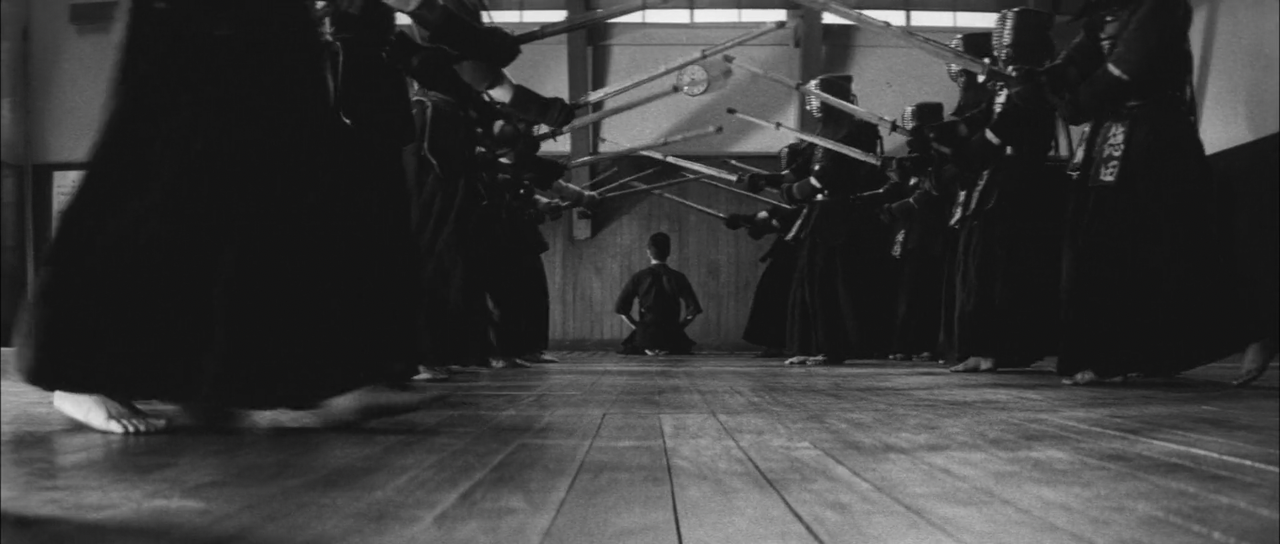
One of the kendōka kneeled on the floor in gruelling punishment faces a clock on the wall, while the other students continue their training. DP: Chikashi Makiura.
A clock face on Tick Tock Day (USA)
After World War II, the Japanese martial arts of #kendo was banished by the occupying forces in an attempt to “remove and exclude militaristic and ultra-nationalistic persons from life”. With that in mind, it makes complete sense that nationalist author and former kendo practitioner Yukio Mishima wrote a short story – Sword, originally published in literary magazine Shincho in 1963 – about the art.
Both the story and Kenji Misumi's 1964 film adaptation follow arrogant kendo student Jiro, played by sublime kabuki actor Raizō Ichikawa who also appears in an earlier Mishima adaptation, 炎上 [Enjō / The Temple of the Golden Pavilion / Conflagration] (1958).
飼育 [Shiiku / The Catch] (Nagisa Ōshima, 1961)
Dec
26
offerings

An altar with two rotund, smiling stone statues – possibly Jizō, a bowl of rice with chopsticks stuck into it, and a Japanese soldier's photograph. The position of the chopsticks tells us that the soldier has died. DP: Yoshitsugu Tonegawa.
少年 [Shōnen / Boy] (Nagisa Ōshima, 1969)
Dec
17
Freebie: National Insurance Awareness Day

The boy waiting next to a buzy road. DPs: Seizō Sengen & Yasuhiro Yoshioka.
Freebie: National Insurance Awareness Day (USA) redux.
A boy (Bin Amatsu), helps out his father and stepmother's insurance money scam by pretending to be injured in traffic.
“This winter… I'm going to the mountain. My mother went to the mountain, as did the mother-in-law of our home. So I have to go too.”楢山節考 [Narayama-bushi kō / The Ballad of Narayama] (Keisuke Kinoshita, 1958)
Dec
11
International Mountain Day
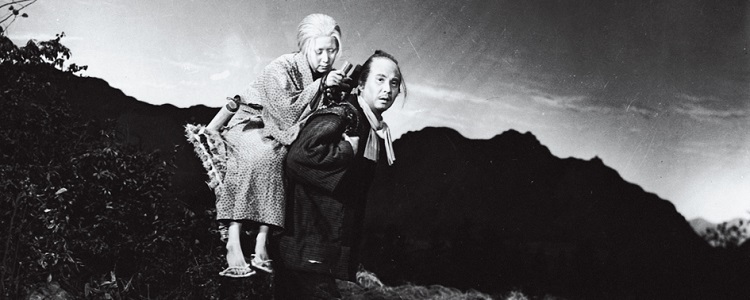
Tatsuhei (Teiji Takahashi) with his mother Orin (Kinuyo Tanaka) in a bamboo carrier on his back. She's combing his hair. Around them the mountain range. DP: Hiroshi Kusuda.
Travel mountains on International Mountain Day
A starving community has come to the agreement that the elders approaching the age of seventy are to be carried up Narayama mountain to die. The day prior to the mountain's festival, sixty-nine year old Orin prepares to leave, carried by her son Tatsuhei.
– Orin
In Keisuke Kinoshita's highly stylised 楢山節考, the arguably cruel (and most likely fictional) practice – of 姥捨て [ubasute, abandoning an old woman] – is superbly abstracted. Narration, dramatic lighting, colour filters and very obviously a soundstage underline that what we're watching is not a film, but a kabuki play.
